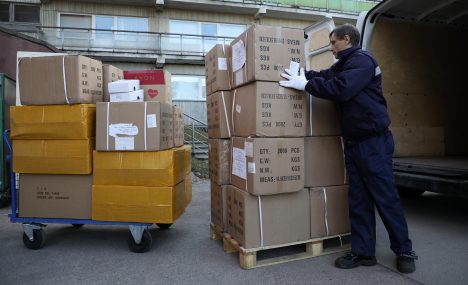 The audit performed recently does not allow for the conclusion that the necessary goods procured by Latvia’s Defence Ministry and Center for Defence Military Sites and Procurement (VAMOIC) were purchased for the most economic prices, as reported by State Audit (VK).
The audit performed recently does not allow for the conclusion that the necessary goods procured by Latvia’s Defence Ministry and Center for Defence Military Sites and Procurement (VAMOIC) were purchased for the most economic prices, as reported by State Audit (VK).
In the report, auditors reveal cases in which, according to VK, contracts were signed with suppliers in a time when goods identical to the ones procured as part of those contracts were available at considerably lower prices. The procurement procedure was not quick in all observed cases. Additionally, auditors also found major problems with surveying of protective gear – the sector the responsibility for which lies with the State Fire and Rescue Service (VUGD).
Continuing inspections, the State Audit evaluated procurement procedures for acquisition of individual protective gear and disinfection substances between 2 April and 9 June, when Defence Ministry and VAMOIC were delegated with responsibility of managing crisis reserves. VAMOIC was provided EUR 45 million from the government. The centre has signed procurement contracts worth a total of EUR 38.9 million. As of 30 June, the centre paid EUR 15.1 million for supplied goods, VK notes.
Non-application of Public Procurement Law does not relieve of the duty to spend state budget finances economically.
Unlike other departments, Defence Ministry was provided with an order in accordance with which procurements are to be organized. There are also recommendations from EU and national institution regarding behaviour in a state of emergency. The defence department, when performing centralized procurements of individual protective gear and disinfection substances, has mostly complied with the specific order.
Between 17 April and by the end of the state of emergency in Latvia (9 June) the procurement procedure in the defence sector was held in two stages. First authorities looked if it was possible to ensure supplies are delivered on time. Evaluation was also performed for security, volumes and document submission criteria. Contenders’ offered prices were evaluated in the second phase. During inspections auditors failed to find sufficient proof that the initially established order was used equally during the entire state of emergency – May and June included.
«State Audit failed to confirm all contracts were signed with contenders who offered the lowest possible prices at the time of submission of offers,»
says State Auditor Elita Krūmiņa. ‘Following the stabilization of the situation, Defence Ministry should have reacted and changed its approach, returning to economical offers, allowing price and quality criteria to dominate in the contender evaluation procedure. Non-application of Public Procurement Law does not cancel the duties outlined in other laws that regulate the public sector’s operations with budget finances and property.’
Without a doubt, deviation from the most economical offers (with respect of prices or costs and procurement contract-related quality criteria) could have been acceptable in a situation when factors associated with security of supplies and the market had signs of a limited supply of individual protection gear and disinfection substances, VK notes. However, as the situation stabilized, the State Audit believes it is not possible to ignore the fact that the range of contenders that are able to offer necessary goods has expanded considerably.
For example, looking at the procurement contracts for single-use surgical masks signed at the end of the state of emergency, auditors could not conclude they were signed with suppliers that would have been able to offer the most convenient prices for the same volume and quality at similar supply conditions, VK states.
«In the period of time between the procurement of surgical masks between 6 May and 27 May, another 21 offer was received but not evaluated.»
Similarly, as concluded by VK, there were also 14 additional offers received for the procurement of single-use surgical gloves in May in between already considered offers.
Sped up procurement process is becoming complicated and convoluted
In the organization of procurements, Defence Ministry and VAMOIC faced problems observed in many countries affected by the pandemic, such as problems with evaluation of goods in a time when certified goods are not available on the market, rapidly growing demand for goods and limited market-dictated conditions. At the same time, there are also local problems to resolve – the existing uncertainty about the volume of purchases of personal protective equipment complicates the procurement process.
In accordance with Cabinet of Ministers ruling of 2 April, Defence Ministry took over from VAMOIC management of state material reserves for the duration of the crisis and from that point on has been performing procurements in accordance with the list of priorities. Defence Ministry did not evaluate or establish any needs of other institutions. Instead it acted in accordance with information compiled and provided by VUGD. Information provided to Defence Ministry regarding priority needs continued changing until the very end of the state of emergency.
VK also notes that types of goods and supply methods were not clearly defined. This made procurement planning more difficult.
According to information from the audit, it can be concluded that Defence Ministry performed procurement of individual protective gear and disinfection substances in one big uninterrupted procurement procedure with multiple approaches being performed nearly simultaneously. This kind of procedure is complicated to follow.
Because there have been public statements that the Public Procurement Law is not used specifically to speed up the supply process, it was likely very hard for entrepreneurs to imagine the procurement procedure is just as complicated and lasting because of administrative procedures. The uncertainty over the procedure could create the impression institutions act irresponsibly, stresses the State Audit.

